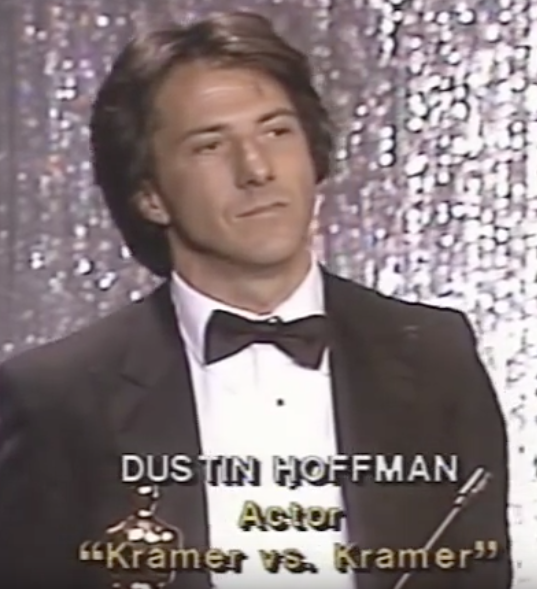We asked Team Experience to share their favourite Oscar acceptance speeches as we countdown to Hollywood's High Holy Night. Here's Ben Miller...
 Dustin Hoffman had an incredible run of films at the start of his career. After breaking through with The Graduate in 1967, he followed that with the legendary Midnight Cowboy, and steadily continued on with Little Big Man, Straw Dogs, Papillion, Lenny, All the President’s Men and Marathon Man. When 1979 rolled around, he was 42 years old and already had three Best Actor nominations under his belt.
Dustin Hoffman had an incredible run of films at the start of his career. After breaking through with The Graduate in 1967, he followed that with the legendary Midnight Cowboy, and steadily continued on with Little Big Man, Straw Dogs, Papillion, Lenny, All the President’s Men and Marathon Man. When 1979 rolled around, he was 42 years old and already had three Best Actor nominations under his belt.
Hoffman was no fan of the Academy at the time. In the midst of his 70’s run, Hoffman called the Oscars a garish and embarrassing evening. He even drew the ire of Frank Sinatra during the 1975 ceremony. Despite that, the Academy didn’t mind all that much as they nominated him again in 79 for Kramer vs. Kramer, and this time they gave him the award...
When he arrives, he looks annoyed, but he lays on a few quick jokes about the Oscar statue and his parents, then he gets to the meat of his issues. Of the other four nominees for 1979 (Jack Lemmon, Al Pacino, Roy Scheider and Peter Sellers), Lemmon was the only other contender to show up. Lemmon even got a big kiss from Hoffman on his way to the stage. After the jokes, Hoffman lays out his case for his problems with the Oscars. He refuses to believe he “beat” the other nominees because of the community of actors should be so strong as to come together and not make it a competition.
On top of making a statement, he figures out a way to incorporate thanking all the filmmakers on Kramer vs. Kramer, as well as the directors who shaped his career along the way. He also points out his Oscar as a symbol of appreciation for the people you don’t see, specifically the broke actors who aren’t working, but have to hold down day jobs. This is a masterclass of a speech.
Very rarely does an acceptance speech actually mean something and even more rarely is something changed because of it. Following Hoffman’s speech, the Academy went away from announcing “…and the winner is” to “…and the Oscar goes to.” You don’t really grasp the meaning of the change until you hear what Hoffman is talking about.
No matter what you think about Hoffman's Kramer vs. Kramer victory, his speech makes the entire endeavor worth it.
 One other takeaway: Jane Fonda spends three full minutes describing the careers of the five nominees before even announcing the “winner.” Some Oscar producer probably watches this clip and shudders at the thought of such long-windedness. I mean, just watch the clip following Hoffman’s speech. Host Johnny Carson made a joke about how long the ceremony is going.
One other takeaway: Jane Fonda spends three full minutes describing the careers of the five nominees before even announcing the “winner.” Some Oscar producer probably watches this clip and shudders at the thought of such long-windedness. I mean, just watch the clip following Hoffman’s speech. Host Johnny Carson made a joke about how long the ceremony is going.
I’m just saying…the Oscars ceremonies were really great in the 70s.